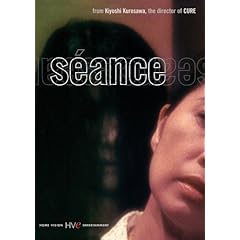 When it comes to horror films, I'm willing to forgive quite a few things the movie going public would probably protest, things that I would find inexcusable in more mainstream fare. In fact I will often embrace these supposed faults. Frequently wooden line readings by non-actors? I actually quite enjoy the rhythms and cadences common to horror films, which are(major exceptions aside) usually lower budget and profile. Predictable plot twists, a tendency to go off the rails plot-wise, and willfully ignoring character development? All problems that I won't even notice for several possible reasons.
When it comes to horror films, I'm willing to forgive quite a few things the movie going public would probably protest, things that I would find inexcusable in more mainstream fare. In fact I will often embrace these supposed faults. Frequently wooden line readings by non-actors? I actually quite enjoy the rhythms and cadences common to horror films, which are(major exceptions aside) usually lower budget and profile. Predictable plot twists, a tendency to go off the rails plot-wise, and willfully ignoring character development? All problems that I won't even notice for several possible reasons.The reasons vary from film to film, and may not always make logical sense; sometimes the reasons don't apply at all, and I'll just flat out hate a movie for reasons I will excuse in another. I make no claims to consistency. If a horror film lacks a certain amount of originality, but is competently made and done with affection, I'll go along with it whole-heartedly. Likewise, if the film is completely slapdash and borderline incompetent, I will forgive that if it at the very least goes to some interesting places. Sometimes all it requires is one scene to bring me over to the movie's side. The Angry Red Planet is, by all accounts, a pretty mediocre example of '50s sci-fi, but it features some pretty excellent creature designs by Alex Toth, so I display it proudly in my collection. Dr. Phibes Rises Again is an utterly worthless sequel to a fantastic film, completely pointless throughout, but it has a last minute reveal that, while it doesn't redeem the film, at least raises the stakes dramatically, so I'm not about to purge it from my collection just yet.
The same theory applies to Seance, an early film by existential horror filmmaker Kiyoshi Kurosawa(although it's unfair to call him a horror filmmaker, as he's made more movies outside of that mold than in it), director of the unnerving Cure, and one of my personal favorites Pulse. Seance is in many ways the most straightforward film Kurosawa has made; the story of a man and his wife who stumble upon a young girl recently escaped from a kidnapper. Instead of taking her immediately to a hospital, the couple decide to keep her for a couple days in order to string the police along with clues, in hopes of gaining fame for the wife's psychic powers. Tales From The Crypt style outcome to follow. Thing is, the wife really is psychic, and she does find the girl through the use of her powers, but unfortunately no one is around to see it, and so, at her insistence, the husband goes along with her plan.
The main problem with the film would have to be consistency. The overall plot is straightforward enough, but the characters are defined more by plot necessity than any actual believable motivation. It's not just that they make ridiculously idiotic choices, but that these choices go against what we've been led to believe about their nature. For the first half of the film the wife is soft spoken, kind, and well-meaning, using her abilities to help people. Yet as soon as she discovers the unconscious girl, she becomes cruel and fame-hungry, ignoring all rational advice. It's also never clear why the husband goes along with these plans.
What the film does succeed at is atmosphere and mood, conveyed through several beautiful, short scenes that could almost be called set pieces if they weren't so low-key. Kurosawa as a horror director has always worked towards unsettling the audience with the implied horror of what is lurking just outside of the frame rather than scaring them with sudden shocks. His films can be terrifying to those willing to invest the time and attention, but boring to those who will wonder where all the scary stuff is. In Seance he attains his goal several times, creating incredible tension out of something as mundane as folding laundry, while wind blown trees allow the light to dance, obscuring and revealing areas in the background of the frame.
Scenes like the above are so visually and emotionally resonant that it's a letdown when the rest of the film can't wholly support their weight. The film is, I have to admit, half-baked. It's a drawback, though, that I'll happily forgive for another chance to get lost in those swaying trees and shifting shadows.
Up next: I continue this theme, applying the same theory of forgiveness to the Zombie Diaries. How will that fare? Tune in this weekend to find out.
[Author's note: I discovered, while writing this, that Seance is a remake of the well-regarded film Seance on a Wet Afternoon, which I have not seen. Perhaps seeing it will provide context that puts this film in better company, but I'm thinking not]
No comments:
Post a Comment